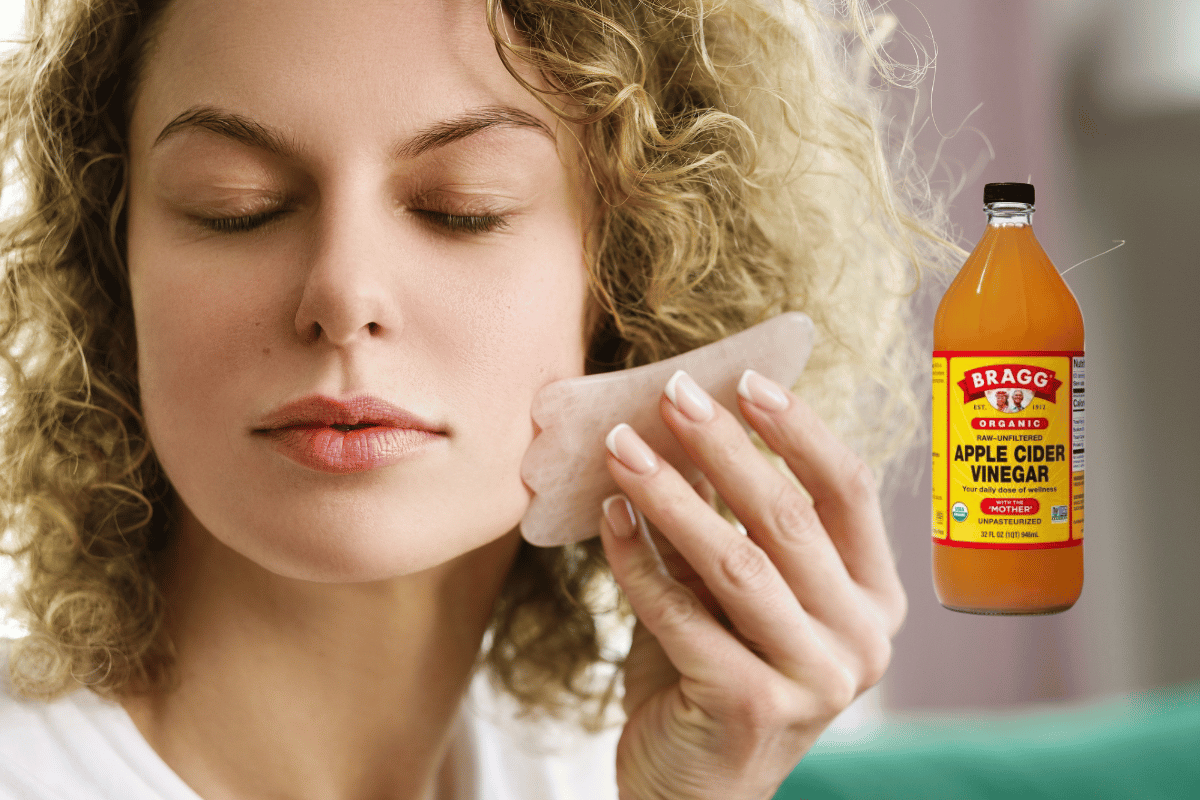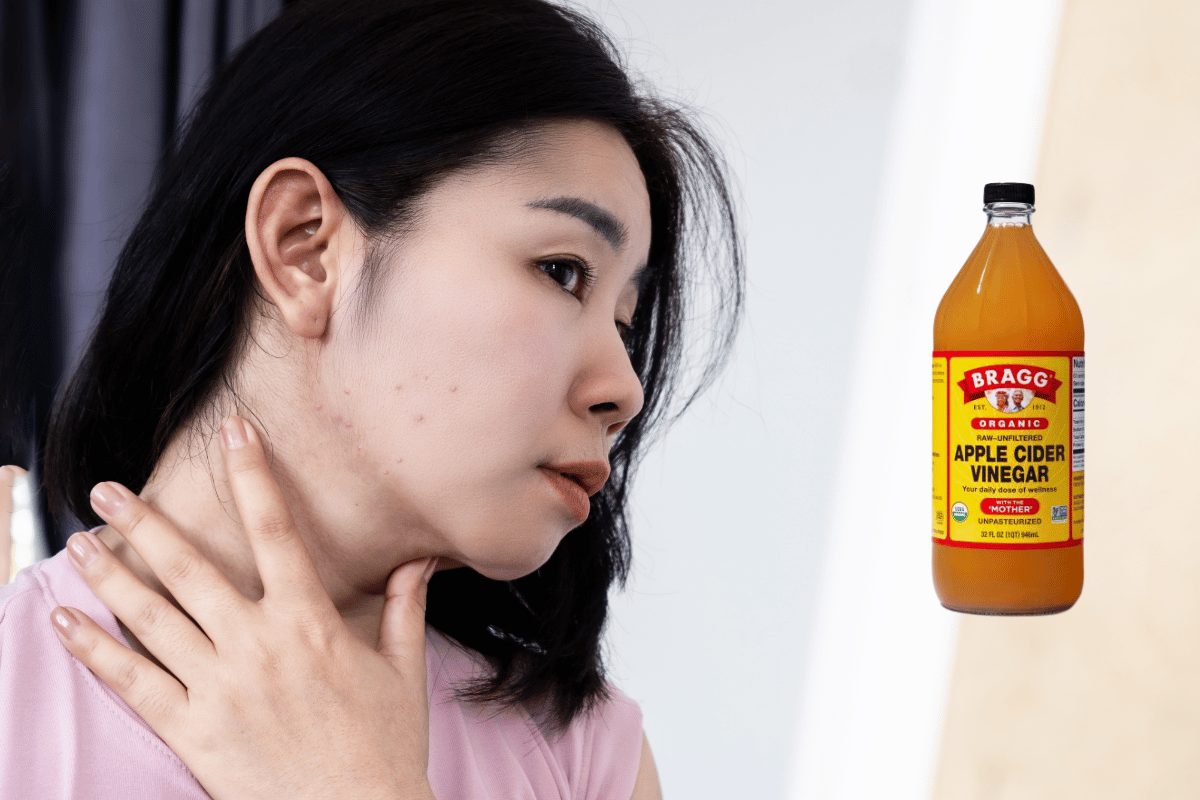Apple Cider Vinegar for a Tighter Jawline: Myth or Reality?
The claim that Apple Cider Vinegar (ACV) can create a tighter jawline has been a topic of much discussion among skincare enthusiasts and experts. To determine whether it’s a myth or reality, it’s essential to analyze claims, testimonials, and expert opinions.
Analyzing Claims and Testimonials:
- Personal Experiences: Many users of ACV report improvements in skin firmness and texture, including the jawline area. These anecdotal claims often mention ACV’s role in reducing puffiness and giving a more defined appearance to the jawline.
- Online Testimonials: Various blogs, forums, and social media platforms feature stories from individuals who have incorporated ACV into their skincare routines, specifically targeting a tighter jawline. While these testimonials are encouraging, they are subjective and vary from person to person.
Insights from Dermatologists and Skincare Experts:
- Professional Opinion: Dermatologists acknowledge the potential benefits of ACV in skincare, primarily due to its acidity and natural compounds. However, they also caution that its effects are not as pronounced or immediate as more conventional skin-tightening treatments.
- Research-Based Evidence: There is limited scientific research specifically linking ACV to jawline tightening. Experts suggest that while ACV can be beneficial for overall skin health, expecting dramatic changes in jawline contour might be optimistic.
While Apple cider vinegar for a tighter jawline shows promise based on user experiences and its known properties, it should not be viewed as a miracle cure. Its effectiveness can vary, and it may be more suitable as part of a comprehensive skincare routine rather than a standalone solution. The next sections will provide a guide to using ACV for facial contouring and discuss the potential side effects and precautions when using it on the skin.
Step-by-Step Guide to Using Apple Cider Vinegar for Facial Contouring
Using Apple Cider Vinegar (ACV) for a tighter jawline involves a careful and informed approach. Here’s a step-by-step guide to using ACV for facial contouring:
- Preparing ACV Mixtures for Topical Application:
- Basic ACV Toner: Mix 1 part ACV with 2 parts water. For sensitive skin, increase the water ratio.
- ACV and Honey Mask: Combine ACV with honey for a nourishing face mask that can enhance skin firmness.
- Patch Test: Before applying ACV on your face, do a patch test on your arm to check for any adverse reactions.
- Application Process:
- Cleansing: Start with a clean face. Use a gentle cleanser to remove any dirt or makeup.
- Applying ACV Toner: Dip a cotton ball or pad in the ACV mixture and apply it gently along the jawline and other areas of your face. Avoid contact with the eyes.
- Mask Application: If using an ACV mask, apply it evenly on your face, focusing on the jawline. Leave it on for about 10-15 minutes before rinsing.
- Frequency of Use:
- ACV toner can be used once or twice daily, depending on your skin’s sensitivity.
- The ACV and honey mask can be used 2-3 times a week.
- Best Practices:
- Always moisturize your skin after using ACV treatments, as ACV can be drying.
- Do not overuse ACV, as it can lead to skin irritation.
- Consistent Routine: For best results, incorporate this ACV regimen into your daily skincare routine.
- Observation and Adjustment: Pay attention to how your skin responds and adjust the frequency or concentration of ACV accordingly.
By following these steps, you can safely and effectively use Apple cider vinegar for facial contouring. While ACV can be a beneficial addition to your skincare routine, remember that achieving a tighter jawline also depends on factors like overall skin care, diet, and genetics.
Potential Side Effects and Precautions When Using ACV on Skin
While Apple Cider Vinegar (ACV) for a tighter jawline can be beneficial, it’s important to be aware of potential side effects and take necessary precautions, especially when using it on the skin.
Understanding Skin Types and ACV Reactions:
- Sensitive Skin: Individuals with sensitive skin may experience irritation or redness. It’s crucial to dilute ACV more than usual and limit its use.
- Dry Skin: ACV can be drying. Those with dry skin should follow up with a hydrating moisturizer after using ACV.
- Oily and Acne-Prone Skin: While ACV can help in controlling oil and breakouts, overuse might disrupt the skin’s natural oil balance.
Safety Measures and When to Avoid ACV:
- Patch Test: Always perform a patch test before applying ACV to your face to check for allergic reactions.
- Dilution Is Key: Never apply undiluted ACV directly to the skin. Always mix it with water to prevent burns or irritation.
- Avoid Open Wounds: Do not apply ACV on broken skin or open wounds.
- Sun Sensitivity: ACV can increase sun sensitivity. Use sunscreen to protect your skin if you’re going out after an ACV application.
Signs to Stop Using ACV:
- Persistent Irritation: If you experience ongoing irritation, redness, or burning, discontinue use immediately.
- Adverse Reactions: In case of severe allergic reactions, wash the area with water and seek medical advice.
While ACV can be a natural and effective way to enhance skin health and contribute to a tighter jawline, it’s important to use it wisely and be mindful of your skin’s response. If in doubt, especially for those with pre-existing skin conditions, consult a dermatologist before incorporating ACV into your skincare routine.

Comparing ACV with Other Natural Remedies for Skin Tightening
When considering Apple Cider Vinegar (ACV) for a tighter jawline, it’s helpful to compare it with other natural remedies for skin tightening to understand its effectiveness and suitability.
ACV vs. Other Natural Ingredients:
- ACV vs. Aloe Vera: Aloe Vera is renowned for its moisturizing and healing properties. While ACV is great for exfoliation and pH balancing, Aloe Vera is better for soothing and hydrating the skin.
- ACV vs. Coconut Oil: Coconut oil is a powerful moisturizer and is known to improve skin elasticity. Unlike ACV, coconut oil is more suitable for dry skin types.
- ACV vs. Green Tea: Green tea is packed with antioxidants and has anti-aging properties. It’s less acidic than ACV and can be a gentler option for skin tightening.
Effectiveness:
- ACV’s effectiveness in skin tightening is mainly due to its acetic acid content, which can improve the skin’s firmness over time.
- Other natural ingredients like Aloe Vera, coconut oil, and green tea offer different benefits, such as hydration, nourishment, and antioxidant protection.
Suitability:
- ACV is suitable for oily and acne-prone skin due to its ability to balance pH levels and reduce oiliness.
- Aloe Vera, coconut oil, and green tea may be more appropriate for those with sensitive or dry skin.
While Apple cider vinegar can be effective for skin tightening and improving jawline contours, its suitability varies depending on skin type and individual concerns. Other natural remedies might be more appropriate for different skin needs. It’s always advisable to choose a skin treatment based on your specific skin type and condition.
Future of Natural Skincare: Where Does ACV Stand?
The future of natural skincare is evolving rapidly, with an increasing emphasis on sustainable, effective, and gentle ingredients. In this context, Apple Cider Vinegar (ACV) stands out as a versatile and potent component, playing a significant role in this shift.
Emerging Trends in Natural Skincare:
- Eco-Friendly and Sustainable Products: Consumers are becoming more conscious of the environmental impact of skincare products. ACV, being a natural and biodegradable ingredient, aligns well with this trend.
- Personalization and DIY Skincare: There’s a growing trend towards personalized skincare routines. ACV’s adaptability in various homemade skincare recipes caters to this preference.
- Scientifically-Backed Natural Ingredients: There is a push for natural ingredients that are not only effective but also backed by scientific research. ACV, with its documented health benefits, fits this criterion.
Role of ACV in Future Beauty Treatments:
- Innovative Product Formulations: We can expect to see ACV being used in more sophisticated skincare formulations, combining its natural benefits with advanced skincare technology.
- Holistic Health and Beauty: ACV’s benefits extend beyond skincare to overall health, resonating with the holistic approach to beauty and wellness.
- Combination Treatments: ACV may be used in combination with other natural ingredients to enhance its efficacy and cater to diverse skin types and concerns.
ACV’s role in the future of natural skincare is promising, given its multifaceted benefits, versatility, and alignment with current trends. As the industry continues to evolve, ACV is likely to remain a key player, both in home remedies and commercial skincare products.
FAQ Section: “Trimming Upper Back Fat with Apple Cider Vinegar: Your Questions Answered”
Q1: How quickly can I see results with apple cider vinegar? A: The timeline for seeing results from using apple cider vinegar for upper back fat reduction varies. Some individuals may notice changes within a few weeks, while for others, it might take longer. Consistent use and combining ACV with a healthy diet and exercise are key factors in determining how quickly results will appear.
Q2: Is apple cider vinegar safe for all moms? A: While ACV is generally safe, it may not be suitable for everyone. Pregnant or breastfeeding moms, those with certain medical conditions, or those on specific medications should consult a healthcare provider before using ACV. It’s also important for individuals with sensitive skin or digestive issues to use ACV with caution.
Q3: Can apple cider vinegar replace exercise and dieting? A: No, ACV should not replace a healthy diet and regular exercise. While it can be a helpful supplement for upper back fat reduction, the best results are achieved when it’s used in conjunction with a balanced diet and consistent physical activity.
Q4: Are there any specific brands of apple cider vinegar recommended? A: Look for organic, unfiltered, and unpasteurized apple cider vinegar, ideally with the “mother” – the colony of beneficial bacteria involved in the creation and fermentation of the vinegar. No specific brand is necessary, but higher quality ACV may yield better results.
Q5: How can I maintain the results achieved with apple cider vinegar? A: To maintain results, continue using ACV as part of your regular health routine, and stick to a balanced diet and regular exercise. It’s also important to stay hydrated and get enough sleep, as these factors contribute to overall health and can help maintain your progress.


Leave a Reply